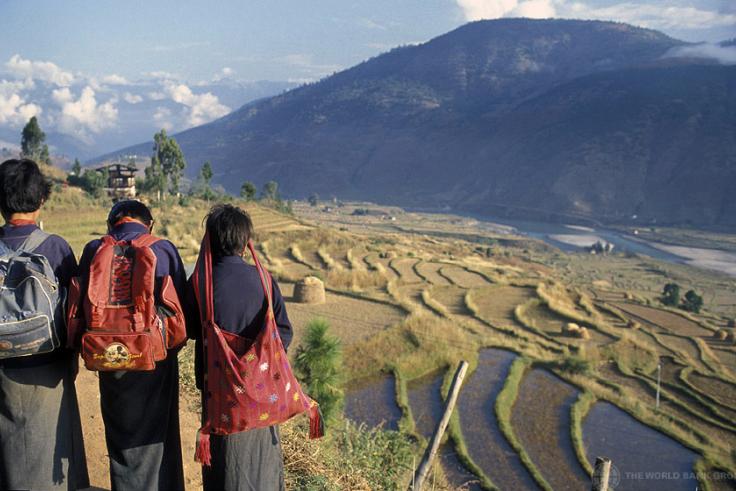 Strengthening Pandemic Prevention, Preparedness, and Response through the One Health Approach
Strengthening Pandemic Prevention, Preparedness, and Response through the One Health Approach
Background
Landlocked in the South Asia region—a region considered one of the global hotspots for emerging infectious diseases—Bhutan is highly vulnerable to disease outbreak threats of pandemic potential. Despite the country’s ongoing health and socio-economic recovery from the COVID-19 pandemic, critical gaps persist in disease surveillance, detection, and coordination response.
Bhutan’s growing demand for livestock products, with most meat products imported from India, has led to greater movement of animals and animal products both within Bhutan and across its borders. This cross-border traffic, combined with Bhutan’s rich biodiversity, pose risks for the spillover of novel pathogens from the wild, including anthrax, rabies, and the highly pathogenic avian influenza.
With the recently awarded $5 million Pandemic Fund grant, Bhutan’s Ministry of Agriculture and Livestock (MOAL), Ministry of Health (MOH), and other One Health stakeholders will carry out the Strengthening Pandemic Prevention Preparedness, and Response through the One Health Approach in Bhutan. FAO and WHO will work in partnership with the Government of Bhutan as Implementing Entities (IEs). The Pandemic Fund grant will leverage an additional $13 million in co-financing and $24 million in co-investment for priority investments based on gaps identified in assessments including the Joint External Evaluation (JEE), the State Party Self-Assessment Annual Reporting (SPAR), and Performance of Veterinary Services (PVS).
Project objectives
The overall objective of the Project is to strengthen national health system resilience and emergency preparedness through improved surveillance, laboratory capacities, and workforce capabilities under a One Health approach for better PPR to public health emergencies.
Implementation arrangements and key components
As the two Implementing Entities, FAO and WHO will provide technical guidance and support project activities under the leadership of the MOAL, MOH, and the Bhutan One Health Secretariat (BOHS) (see below).
The Project has four main components. Implementing Entity support is indicated under each component.
- Operationalizing the BOHS. To institutionalize a sustainable One Health approach mechanism in the country and monitor the progress of the Project, the BOHS will be operationalized consisting of member representatives from Agriculture, Health, and relevant One Health partners. BOHS will organize workshops to update the One Health Strategic Plan, establish an intersectoral communication framework, train focal points, and standardize knowledge management for improved transparency and information sharing (FAO, WHO).
- Strengthening surveillance and early warning. This component will strengthen disease surveillance by developing standard operating procedures and training district level staff to assess risk, zoonotic diseases, food borne pathogens, and antimicrobial resistant (AMR) organisms. It supports upgrading web-based surveillance to include veterinary information systems, lab management systems, farm registration, and biosecurity and biosafety systems, including at points of entry. Community-based surveillance will be strengthened by training up to 500 community and animal health workers. This component aligns with and complements the Asian Development Bank-supported financing to develop the electronic Patient Information System which will integrate data sources from multiple systems to allow for more efficient disease surveillance (FAO, WHO).
- Upgrading laboratory systems. These activities center on laboratory quality assurance to include biosafety and biosecurity protocols while strengthening policy and regulations. Facility upgrading and staff training will be done in order to certify human and animal health laboratories for molecular testing. This component will also help to institutionalize national biosafety policies to promote the sharing of best biosecurity practices in annual stakeholder meetings and workshops. The laboratory component aligns with and complements existing World Bank financing to expand laboratory capacity (FAO, WHO).
- Investing in human resource capacity. This component includes the creation of a national workforce registry and the provision of continuous education and cascade training to all sectors for pandemic PPR. Training areas include AMR, mentorship programs, risk communication and community engagement, biorepository management, molecular diagnostics, advanced (veterinary) epidemiology, and data analysis for disease modelling and forecasting (FAO, WHO).
Expected outcomes
The implementation of the activities above will lead to outcomes outlined in the Pandemic Fund Results Framework. JEE, SPAR, and PVS scores for indicators are expected to increase, demonstrating Bhutan’s achievement of:
- A functional early warning and holistic disease surveillance system
- Synergized approaches to prepare and respond to health emergencies
- Increased cooperation among sectors and initiatives for preparedness and response efforts
For general inquiries: the_pandemic_fund@worldbank.org
-
 RegionProject RegionsSouth Asia
RegionProject RegionsSouth Asia -
 CountryProject CountriesBhutan
CountryProject CountriesBhutan -
 Amount Approved (US$) $4,950,676
Amount Approved (US$) $4,950,676 -
 Total Co-financing
Total Co-financing
(in kind & in cash) (US$) $12,912,908 -
 Total Co-investment
Total Co-investment
(in kind & in cash) (US$) $24,153,745
Related Links
- FAO Bhutan Project Page
-
FAO champions implementation of 12 projects as The Pandemic Fund rolls out first round of financing
FAO | August 10, 2023 -
Tripartite supported National Workshops on One Health Zoonotic Diseases Prioritization and Joint Risk Assessment under Pandemic Fund in Bhutan
May 2024 -
Bhutan launches USD 4.95M Pandemic Fund Project to strengthen One Health Approach
FAO | July 5, 2024 -
Press Release: Procurement of New Laboratory Equipment at Royal Center for Disease Control
Royal Government of Bhutan, Ministry of Health | August 8, 2025 -
Stronger Labs, Safer Bhutan
August 11, 2025

